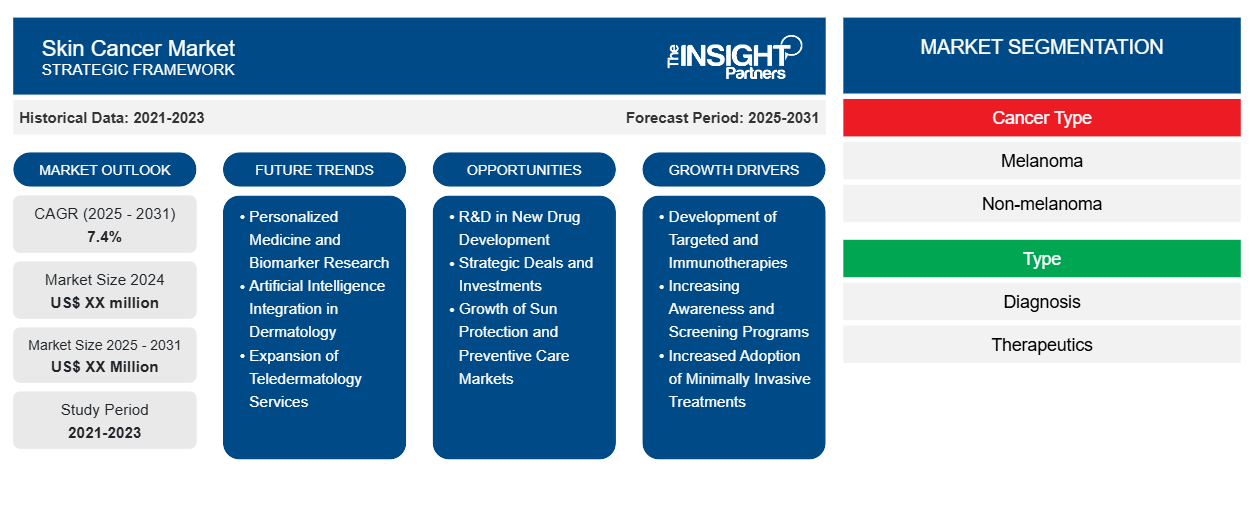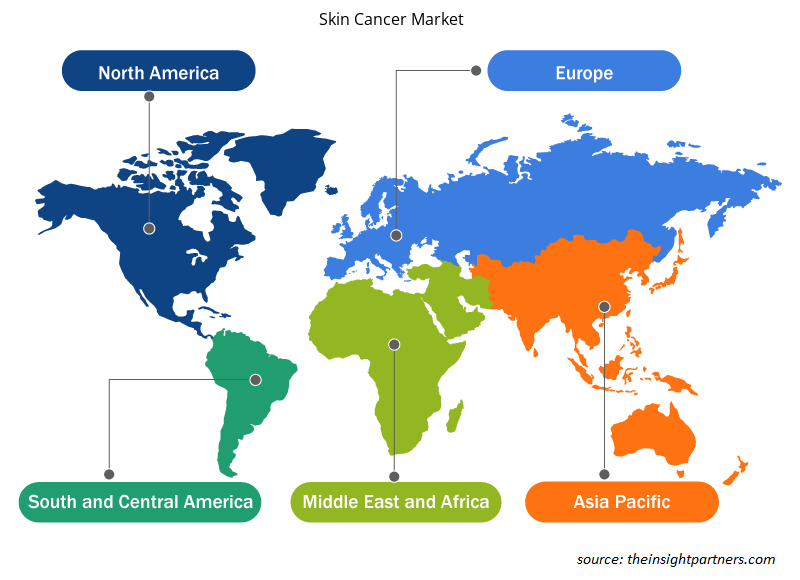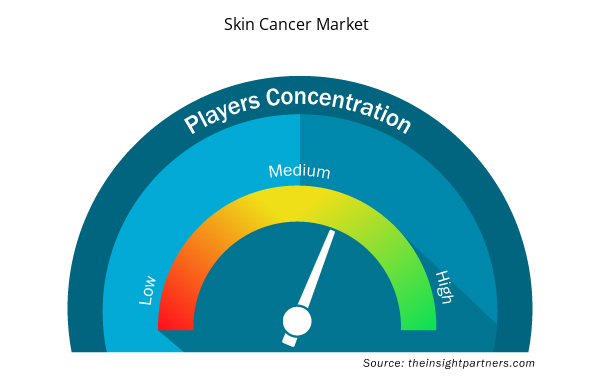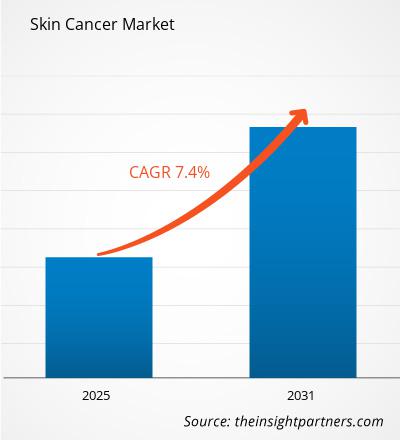The Skin Cancer Market is expected to register a CAGR of 7.4% from 2025 to 2031, with a market size expanding from US$ XX million in 2024 to US$ XX Million by 2031.
The Skin Cancer Market report covers analysis by Cancer Type (Melanoma, Non-melanoma); Type (Diagnosis , Therapeutics), and Geography (North America, Europe, Asia Pacific, and South and Central America). The global analysis is further broken-down at regional level and major countries. The report Offers the Value in US$ for the above analysis and segments.
Purpose of the Report
The report Skin Cancer Market by The Insight Partners aims to describe the present landscape and future growth, top driving factors, challenges, and opportunities. This will provide insights to various business stakeholders, such as:
- Technology Providers/Manufacturers: To understand the evolving market dynamics and know the potential growth opportunities, enabling them to make informed strategic decisions.
- Investors: To conduct a comprehensive trend analysis regarding the market growth rate, market financial projections, and opportunities that exist across the value chain.
- Regulatory bodies: To regulate policies and police activities in the market with the aim of minimizing abuse, preserving investor trust and confidence, and upholding the integrity and stability of the market.
Skin Cancer Market Segmentation
Cancer Type
- Melanoma
- Non-melanoma
Type
- Diagnosis
- Therapeutics
Customize This Report To Suit Your Requirement
You will get customization on any report - free of charge - including parts of this report, or country-level analysis, Excel Data pack, as well as avail great offers and discounts for start-ups & universities
Skin Cancer Market: Strategic Insights

- Get Top Key Market Trends of this report.This FREE sample will include data analysis, ranging from market trends to estimates and forecasts.
Skin Cancer Market Growth Drivers
- Development of Targeted and Immunotherapies: Targeted therapies, such as BRAF and MEK inhibitors for melanoma, and immunotherapies, including checkpoint inhibitors or PD-1/PD-L1 inhibitors, have emerged as a revolutionary line of treatment for skin cancer. These therapies are more effective and less harmful than classic chemotherapy; thus, the demand for these therapies is increasing, which in turn drives the market growth.
- Increasing Awareness and Screening Programs: Public health campaigns and government initiatives advocate for periodic skin screening to ensure early detection and treatment. Organizations such as the Skin Cancer Foundation and the American Academy of Dermatology have been aggressively voicing sun protection and early diagnosis, hence creating awareness and causing more people with suspicious skin lesions to seek medical attention.
- Increased Adoption of Minimally Invasive Treatments: The popularity of minimally invasive treatments, such as cryotherapy, laser therapy, photodynamic therapy, and Mohs surgery, has grown due to their success and the reduction in postoperative recovery time. These less-invasive treatments, which work to destroy precisely the tumor with the least damage to the surrounding tissues, are increasingly favored by patients and physicians alike.
Skin Cancer Market Future Trends
- Personalized Medicine and Biomarker Research: Advances in genomic profiling and biomarker research enable personalized treatment approaches for skin cancer patients. The identification of particular genetic mutations and molecular markers allows for treatment tailored to the individual, therefore maximizing efficacy while minimizing adverse effects. There is little doubt but that precision medicine will play a significant role in the future regarding the treatment of skin cancer.
- Artificial Intelligence Integration in Dermatology: AI and machine learning are improving the diagnosis of skin cancer by enhancing the sensitivity of diagnostic imagery and helping dermatologists pick out malignant lesions. AI-powered dermatology platforms enhance diagnostic productivity, reduce false positives, and facilitate early interventions that can make a significant difference in the possibility of treatment success.
- Expansion of Teledermatology Services: This growth in telemedicine and other digital health solutions has increased access to skin cancer screenings, particularly for the most remote or underserved regions. Virtual access to dermatologists will continue to improve early detection and thus timely medical intervention, seen with increased rates that will further accelerate this trend because of the growing adoption of digital healthcare solutions.
Skin Cancer Market Opportunities
- R&D in New Drug Development: New generation therapeutic options under research and development at pharmaceutical and biotech companies also include next-generation immunotherapies, vaccines, and small-molecule inhibitors. Increased commercialization of enhanced and safer, better-tolerated treatments would contribute to improving the market environment and widening new opportunities for the treatment of skin cancer.
- Strategic Deals and Investments: Companies are increasingly into mergers, acquisitions, and partnerships to further strengthen their market position and hasten drug development. This trend is being supported by various collaborations between pharmaceutical firms, research institutions, and healthcare providers that spur quicker innovation and access to the latest life-sustaining treatments.
- Growth of Sun Protection and Preventive Care Markets: More specifically, the growing awareness about the risk of skin cancer is tapping into the market increasingly for sun protection products like sunscreens, UV-protective clothing, and wearable UV sensors. Therefore, prevention measures are growing fast and offer companies an avenue for innovative sun protection solutions.
Skin Cancer Market Regional Insights
The regional trends and factors influencing the Skin Cancer Market throughout the forecast period have been thoroughly explained by the analysts at Insight Partners. This section also discusses Skin Cancer Market segments and geography across North America, Europe, Asia Pacific, Middle East and Africa, and South and Central America.

- Get the Regional Specific Data for Skin Cancer Market
Skin Cancer Market Report Scope
| Report Attribute | Details |
|---|---|
| Market size in 2024 | US$ XX million |
| Market Size by 2031 | US$ XX Million |
| Global CAGR (2025 - 2031) | 7.4% |
| Historical Data | 2021-2023 |
| Forecast period | 2025-2031 |
| Segments Covered |
By Cancer Type
|
| Regions and Countries Covered | North America
|
| Market leaders and key company profiles |
Skin Cancer Market Players Density: Understanding Its Impact on Business Dynamics
The Skin Cancer Market market is growing rapidly, driven by increasing end-user demand due to factors such as evolving consumer preferences, technological advancements, and greater awareness of the product's benefits. As demand rises, businesses are expanding their offerings, innovating to meet consumer needs, and capitalizing on emerging trends, which further fuels market growth.
Market players density refers to the distribution of firms or companies operating within a particular market or industry. It indicates how many competitors (market players) are present in a given market space relative to its size or total market value.
Major Companies operating in the Skin Cancer Market are:
- Pfizer Inc.
- Bristol-Myers Squibb Company
- Abbott Laboratories
- Amgen, Inc.
- Merck & Co., Inc.
- Novartis AG
Disclaimer: The companies listed above are not ranked in any particular order.

- Get the Skin Cancer Market top key players overview
Key Selling Points
- Comprehensive Coverage: The report comprehensively covers the analysis of products, services, types, and end users of the Skin Cancer Market, providing a holistic landscape.
- Expert Analysis: The report is compiled based on the in-depth understanding of industry experts and analysts.
- Up-to-date Information: The report assures business relevance due to its coverage of recent information and data trends.
- Customization Options: This report can be customized to cater to specific client requirements and suit the business strategies aptly.
The research report on the Skin Cancer Market can, therefore, help spearhead the trail of decoding and understanding the industry scenario and growth prospects. Although there can be a few valid concerns, the overall benefits of this report tend to outweigh the disadvantages.
- Historical Analysis (2 Years), Base Year, Forecast (7 Years) with CAGR
- PEST and SWOT Analysis
- Market Size Value / Volume - Global, Regional, Country
- Industry and Competitive Landscape
- Excel Dataset



Report Coverage
Revenue forecast, Company Analysis, Industry landscape, Growth factors, and Trends

Segment Covered
This text is related
to segments covered.

Regional Scope
North America, Europe, Asia Pacific, Middle East & Africa, South & Central America

Country Scope
This text is related
to country scope.
Frequently Asked Questions
The major factors driving the Skin Cancer Market are Development of Targeted and Immunotherapies, Increasing Awareness and Screening Programs, and Increased Adoption of Minimally Invasive Treatments
The key future trends of the market are Personalized Medicine and Biomarker Research, Artificial Intelligence Integration in Dermatology, and Expansion of Teledermatology Services
The leading players operating in the Skin Cancer Market include Pfizer Inc., Bristol-Myers Squibb Company, Abbott Laboratories, Amgen, Inc., Merck & Co., Inc., Novartis AG, F. Hoffmann-La Roche Ltd, Sanofi S.A., Qiagen NV.
The report can be delivered in PDF/PPT format; we can also share excel dataset based on the request.
Some of the customization options available based on the request are an additional 3–5 company profiles and country-specific analysis of 3–5 countries of your choice. Customizations are to be requested/discussed before making final order confirmation, as our team would review the same and check the feasibility.
Trends and growth analysis reports related to Life Sciences : READ MORE..
1. Pfizer Inc.
2. Bristol-Myers Squibb Company
3. Abbott Laboratories
4. Amgen, Inc.
5. Merck & Co., Inc.
6. Novartis AG
7. F. Hoffmann-La Roche Ltd
8. Sanofi S.A.
9. Qiagen NV
10. Sun Pharmaceutical Industries Ltd

 Get Free Sample For
Get Free Sample For